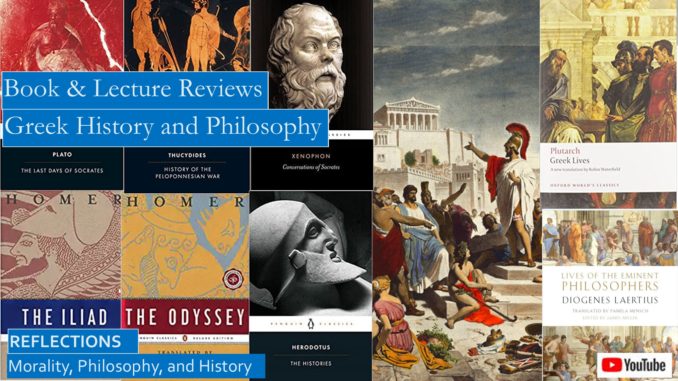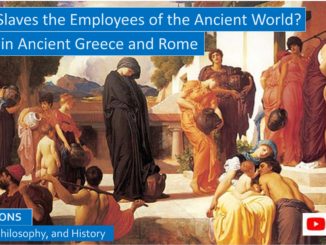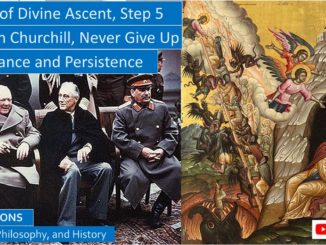
These quick book reviews include links to our YouTube videos and blogs on ancient Greek history, biography, and philosophy. Since we seek to draw moral lessons from history, we favor the Lives of Noble Greeks and Romans by Plutarch.
ANCIENT GREEK HISTORIANS
In his histories, Herodotus wants to remember the mighty deeds performed by both Greeks and Persians in the Greco-Persian Wars. He was inspired by Homer, his stories about the ancient history of Greece include many stories about the gods, although he also was a somewhat careful historian in his own unique way. Thucydides, who derided the many fanciful stories of Herodotus, is considered to be the first modern historian who seeks accuracy rather than entertainment. Their lifespans were only separated by about two decades, they were contemporaries, although history does not mention that they ever met. Thucydides and Xenophon were both generals. Thucydides ended his history of the Peloponnesian Wars mid-chapter, mid paragraph, and mid-sentence, and Xenophon’s history of the war started at that point. The works written by Xenophon of Athens were favorites of both ancient and medieval scholars, but modern scholars tend to deprecate him. Plutarch is a Roman writer and stoic philosopher who wrote is Lives of Greeks and Romans about 450 years later, and used these Greek authors as important sources, plus other sources that are lost to modern scholars.
YouTube video for this blog: https://youtu.be/472aVKkPsk8
YouTube script with book links: https://www.slideshare.net/BruceStrom1/book-and-lecture-reviews-of-ancient-greek-history-and-philosophy
WARS OF ANCIENT GREECE
Understanding the wars is key to understanding Greek history.
- The Trojan War, when gods still mingled with humans were about eight centuries prior to the Greco-Persian Wars. The Trojan War likely was fought in 1100 BC. It may have been a mythical war, although most historians speculate the myths were a remembrance of an actual struggle.
- In the Greco-Persian Wars, fought between 499 and 479 BC, the Greeks unexpectedly defeated the Persians through a combination of luck, fortune, bold leadership, bold military attacks, and superior naval and hoplite battle tactics.
- Just fifty years later the Athenians and Spartans fought the Peloponnesian Wars, these wars have been compared to the great World Wars I and II, these wars were fought for close to three decades by two generations of Greek soldiers.
- The consequences of these wars, and the unending conflicts following these wars, made the Greek city-states vulnerable for domination by Alexander the Great in the next century.
BOOK AND LECTURE REVIEWS, PELOPONNESIAN WARS
Thucydides is a wonderful writer; he was a general in the Athenian army who was exiled when he was blamed when he was unable to prevent the capture of Amphipolis with its important silver mines. His histories record both the sparks that ignited the Peloponnesian Wars, and also explored the true causes of the wars, and the hidden resentments and motivations for all the actors in each phase of the war, both through observations and the many speeches, based on the memory of what the speakers said and what Thucydides reasoned they should have said.
Xenophon continues his history of the Peloponnesian Wars from where Thucydides left off, though with fewer speeches. His history is more straight history than the history of Thucydides.
Will Durant in the Life of Greece is speaking from the moral point of view of an Englishman in the early 20th century, and he compares the Athenian Empire to the British Empire. Like the classical historians, he seeks out the moral lessons of history, and he is just as quotable.
We look forward to reflecting on the Platonic dialogue, Alcibiades 1. Modern scholars deprecate this dialogue, they doubt that Plato was the author, but both ancient and medieval scholars value it as a prime example of the Platonic dialogue, so of course we look forward to studying this work.
In our videos on the Peloponnesian Wars, we used Thucydides and Plutarch as our main sources. Since we are interested in the moral lessons in the lives of the main characters, we favor Plutarch’s Lives of Noble Greeks and Romans. Plutarch wrote twenty-four paired lives of Greeks and Romans whom he thought common moral qualities. Plutarch wrote his Lives in the beginning of the second century AD, about 450 years after the Age of Pericles, using Herodotus, Thucydides, Xenophon, and many lost works as his sources.
We find the translation by Robin Waterfield quotable and readable, but the Oxford World Classics only include nine prominent Greek Lives. The two-volume of all Plutarch’s Lives with the Dryden translation, unfortunately, is less quotable, with many awkward wordy constructions we are forced to recast and condense so they are as quotable as the original.
Our videos on Plutarch’s Greek Lives reflect on:
- Theseus, the mythical first king of a united Attica.
- The Athenian lawgiver Solon.
- The Spartan lawgiver Lycurgus.
- The Athenian leader Themistocles who led Greece to victory in the Battle of Salamis in the Greco-Persian Wars.
- The orator Demosthenes, who later warned the Athenians and the Greeks about the motives of King Philip and Alexander the Great of Macedon.
For the Peloponnesian Wars, we reflect on:
- The radical Athenian democrat Pericles.
- Aristides the Just of Athens.
- The peacemaker Athenian general Cimon.
- The failed Athenian general Nicias.
- The outrageous patriot and traitor, Alcibiades of Athens.
- The Spartan commander Lysander, who showed mercy on Athens when she lost the war.
We have a series of videos reflecting on the Peloponnesian Wars, in the first video we also examine the history behind these ancient historians. Our first set of videos reflects on the fifty-year tension-filled period between the Greco-Persian Wars and the Peloponnesian Wars, and the establishment of the radical democracy and the first years of the war under Pericles, up until his death by the plague.
In the final set of videos on the Peloponnesian Wars we examine both history and Plutarch’s moral biographies of the key Athenian and Spartan leaders during and ending this first great war of history. Alcibiades was a leading character both in these wars and in the Platonic dialogues, including the Symposium and Alcibiades I.
One of my favorite professors with the Teaching Company, now Wondrium, is Kenneth Harl, he is an excellent and enthusiastic lecturer who knows his material cold, and discusses his personal original scholarship occasionally, his favorite phrase is, “This interpretation of history may be overdrawn.” This is a thirty-six lecture set, he devotes entire lectures to some important topics that I linger on for only a sentence or a paragraph or two, such as Corcyra, Megara, Corinth, Potidaea, the Delian League, and the thirty-year-peace.
Professor Harl says that an important ancient source for the Peloponnesian Wars is the ancient first century Greek historian Diodorus Siculus, which we may consult for future lectures.
https://en.wikipedia.org/wiki/Diodorus_Siculus
The Teaching Company/ Wondrium professor, Jeremy McInerney, provides another perspective in his lectures on the Age of Pericles. He has many lectures on the culture and theater, and the building program, including the Parthenon and fleets of triremes. These two professors have many lecture series, Professor Harl has more lectures covering the succeeding centuries.
These professors have other videos on ancient Greek history. The middle two lectures are additional lectures by Professor McInerney, the others are by Professor Harl, and he has other excellent lectures set in later eras. They both have lectures on Alexander the Great, and Professor Harl’s lectures on the Fall of the Pagans is one of my favorites.
Rufus Fears is another one of my favorite and entertaining professors with the Teaching Company, now Wondrium, he has a series of lectures on Greek Lives, and also Roman Lives. Rufus Fears personifies the strengths and weaknesses of oral tradition, if he had been alive in the times of the ancient Greeks, he would have been a traveling bard. Rufus Fears always grasps the most salient summaries of these Greek Lives, he loves to point out which historical figure live by a moral compass, but his weakness is sometimes small inaccuracies slip into his lectures.
BOOK AND LECTURE REVIEWS, BEYOND THE PELOPONNESIAN WARS
Xenophon’s history of the Persian Expedition this was famous in both ancient times and the Middle Ages, it is a gripping and entertaining account of his trials and adventures in Persia. Xenophon signed up with many other Greek mercenaries in the Persian army of Cyrus, descendant of Cyrus the Great, who was contesting the throne of Persia. The Greeks were victorious in battle, and to clinch his victory, Cyrus and his forces, in a tactic Alexander the Great would later repeat, charged the forces surrounding King Artaxerxes II, but was killed instantly when an unlucky spear went through his head, killing him instantly.
These Greeks were now stuck in the middle of Persia with no friends. Their leadership was wiped out in a peace banquet, so the Greeks, being Greeks, just elected new leaders, including the newly promoted general Xenophon. He helped lead the Greeks out of the depths of Persia, beating back constant ambushes, on a two-year march up the Tigris River, through mountain ranges, finally reaching the safety of the Greek colonies on the shores of the Black Sea. This saga suggested to King Phillip and his son Alexander the Great of Macedon how the weak Persian Empire was ripe for the taking.
The ancient author Arian has more adventure stories told about the amazing campaigns of Alexander the Great, who never lost a battle, and who brought Greek culture to much of Asia. These two books provide moral lessons on the value of persistence and courageous enterprise, but they’re mainly just fun stories to read.
We found this collection of lectures by Professor JB Bury from the early twentieth century on the ancient historians of Greece, including Homer, Herodotus and Thucydides.
The Athenian Constitution was written not by Aristotle, but by a student of Aristotle. The Athenian Constitution tells us much of what we know about the details of how the Athenian courts, juries, and democracy functioned. It was deemed lost until scholars found papyrus copies of this work in the trash dumps of ancient Egypt in the late nineteenth century.
A detailed discussion of the Athenian Constitution is included in our video on Ordinary Life and Justice in Ancient Greece.
Professor Robert Garland gave the lectures on the Other Side of History, Daily Life in the Ancient World, surveying conditions in Egypt, Greece, and Rome. His lectures on Athenian Democracy includes some lectures on what justice, juries, and courts was like for ordinary Greeks. The Long Shadow of the Ancient Greek World by Professor Ian Worthington goes further back to the end of the Greek Dark Ages at around 700 BC in its history. The Athenian Democracy and the Long Shadow lectures are indebted to the Athenian Constitution for the details they provide. These three lecture series were sources for our video on Ordinary Life and Justice in Ancient Greece.
BOOK AND LECTURE REVIEWS, HERODOTUS AND GRECO-PERSIAN WARS
Herodotus’ Histories are an absolute joy to read, he seeks to have his Histories recited to Greeks who attend the festivals, so they need to be entertaining. Herodotus’ curiosity and gullibility leads to many captivating and hard-to-believe yarns about the culture and myths of the various lands in Persia, Egypt, Greece, and surrounding lands. He is also called the first ethnographer, and his Histories are also one of the first Travelogues of the ancient world. But, over the years, archaeologists and historians have found proof for many outlandish-sounding tall tales that Herodotus told.
Xenophon was a great fan of the original Cyrus the Great who conquered much of the Babylonian Empire, and also brought the Greek colonies of Asia Minor into his empire. Xenophon wrote The Expedition of Cyrus which was highly acclaimed in both the ancient and medieval world, perhaps we will reflect on this work in a future video.
Another work that is quoted often by ancient authors is the Works and Days of Hesiod, this contains many stoic sayings that reflect on the strengths of the Greek warrior culture. The translator speculates that the Theogony was written by someone other than Hesiod, since the style of these two works differ radically.
The Britannica salesmen sold many copies of their series, the Great Books of the Western World, a bookcase full of books which many proud owners eager to show off their educated values exhibited next to their silent pianos, both excellent pieces of passive furniture. There are so unread and unmarked copies out there that you can cherry-pick individual used copies of selected volumes of this series, including this volume that includes all the Greek plays that survived from antiquity, for a very reasonable price. They have no footnotes, but we can instead rely on Dr Wikipedia for background information.
The first of our series of videos on the Greco-Persian Wars includes a discussion on Herodotus, including comments by Professor JB Bury. Another video includes a play by Aeschylus, which is an eyewitness account of the Battle of Salamis, written from the point of view of the Persians, who were outwitted by the Athenian leader Themistocles.
We also highly recommend the Great Courses/ Wondrium lectures by Professor Elizabeth Vandiver. The first half dozen lectures provide excellent background on ancient Greek history up to the time of Herodotus. Most of her lectures are a consensus of scholarly opinion, as we see the themes in her lectures repeated in many other lectures on ancient Greece.
The Great Courses on the Greek-Persian Wars by Professor Hale also provided interesting archaeological evidence used by modern historians to add to and correct the classical literary evidence that is our primary sources.
BOOK AND LECTURE REVIEWS, ILIAD AND ODYSSEY, AND LEGENDS
The style of the Iliad and the Odyssey differs so much that some scholars speculate that there were two Homers. The Iliad is an epic poem, while the Odyssey reads more like a modern novel, complete with multiple flashbacks. Homer’s Iliad and Odyssey show how the ancient Greek culture, and all ancient cultures, were warrior cultures. All ancient cultures were warrior cultures by necessity, because if a city-state was defeated by a hostile power, often the men were slaughtered, and the women and children were forced into slavery.
The first word in the Iliad is RAGE, the rage of Achilles, not against the Trojans, but against King Agamemnon, who has snatched his concubine Briseis. The Iliad is also a character study of our flawed hero Achilles, as he ponders the meaning of war, the meaning of life, the empathy of suffering.
The Odyssey tells us the decade-long journey of Odysseus, and how he, with his son, a few slaves, and the disguised goddess Athena, are compelled to fight the hundred suitors seeking to marry his abandoned wife Penelope. The Odyssey stresses Xenia, or hospitality towards strangers, and Odysseus meets many monsters and sorceresses and princesses, some who are good hosts, some who are bad hosts.
We include here the Tales of the Northwest, one of the best depictions of the warrior culture of the American Indians. We compare these tales to those in the Iliad, there are many similarities in these two stoic cultures.
Another work of myth and legend is the voyage of Argo by Apollonius of Rhodes, including the tale of Jason and the Argonauts, and their quest for the Golden Fleece, and his horrible sorceress wife, Medea, who murders her own sons in the Greek play Medea by Euripides.
Our first video in this series examines the Iliad and Greek culture, and reflects on the scholarly debates on whether Homer existed, whether there were several Homers, and on oral history as recited by the bards of old. We have videos reflecting on what the Iliad reveals to us about the ancient Greek warrior culture, comparing it to the American Indian warrior culture, and also comparing the Greek practice of capturing concubines in war to the laws in the Torah, or the Old Testament, exhorting that captured concubines must be treated with the respect due to Jewish wives. Finally, we explore the tensions in the Iliad’s depictions of the glory and honor of war versus the madness and futility of war.
Some additional material included in Professor Elizabeth Vandiver’s lectures on the Iliad is a poem by a World War I soldier that imagined the fiery visage of Achilles, lit by Aphrodite at dusk, above the trenches near the beaches where the Greek ships were moored, and how this frightened the enemy. She also discusses in greater depth the embassy of the three Greek soldiers to coax Achilles into battle, and the moral lessons we can draw from this camp meeting that went badly, and the funeral games, among others.
Professor Elizabeth Vandiver also recorded lectures on the Odyssey by Homer, and its theme of Xenia, or hospitality to strangers. Some monsters, like the Cyclops, rather than offering hospitality and a hot meal to strangers, instead eat them for dinner. Sometimes a sorceress will turn travelers into swine, but offer xenia when Odysseus outwits them, with the help of the gods. Sometimes beautiful princesses pose a danger of a different sort, when they seek to make their prince Odysseus, but our hero longs to return to his Penelope.
Professor David Schenker also has lectures on Masterpieces of Greek Literature, where he discusses the Iliad and the Odyssey.
Professor Elizabeth Vandiver has other courses excellent lecture series.
BOOK AND LECTURE REVIEWS, GREEK PHILOSOPHY
The Penguin Classics have many of the dialogues of Plato, the Penguin classics series have both good introductions and good translations. This collection of the Last Days of Socrates includes several Platonic dialogues. Stay away from the paperback, The Complete Dialogues of Plato on Amazon, the typeface is so tiny it is impossible to read. Barnes and Nobles has a good collection of the main dialogues of Plato.
We cut some videos using Xenophon’s Conversations of Socrates as a main source, his Socrates is more of a stoic moral teacher than the more mystical Socrates of Plato’s dialogues. Just as the Jesus in the synoptic gospels differ from the Jesus of the Apostle John, so the Plato of the so the Socrates of Plato is very different from the Socrates of Xenophon.
So many scholars quote from the Lives of the Eminent Philosophers, written by Diogenes of Laertius, that I purchased this history myself, half the book is scholarly essays in the Appendix on both Diogenes and these early philosophers. His essays on the best-known philosophers, including Plato, do not tell us more than the other ancient sources, bur this is the only or predominant source for early and minor Greek philosophers. If any of these essays were submitted as a college term paper today, it might qualify for a solid “C.” Scholars suspect Diogenes was an Epicurean, since his last chapter on Epicurus is more complete than the other chapters and is the only chapter that includes major excerpts from the philosopher’s writings. For all the other philosophers, Diogenes repeats anecdotes and illustrative incidents from their lives.
The Early Greek Philosophy book is a collection of snippets from the pre-Socratic philosophers. The teachings of Socrates, and the philosophical works of Plato and Xenophon, were so influential that there was little enthusiasm for copying the works of the early Greek philosophers, some are only mentioned in Diogenes, or snippets quoted by Aristotle or other ancient Greek writers.
These three Great Courses lectures were used as sources in our videos on the Platonic dialogues. Professor Schenker in Masterpieces of Greek Literature makes many of the same points as does Professor Vandiver. Professor Segrue in Plato, Socrates and the Dialogues is so enthusiastic about Plato that one wonders if his is a sort of platonic religion. All three are excellent sets of lectures.
We have two videos on the Plato’s dialogues and Xenophon’s treatise on the trial and execution of Socrates, plus a video on the Stoic Socrates of Xenophon, plus a video on how the slanders of the comic Aristophanes may have contributed to the eventual execution of Socrates.
Our videos for Zeno, the first Greek Stoic Philosopher, the Greek Cynic Philosophers, and Epicurus, all used the Lives of Eminent Philosophers by Diogenes of Laertius as their solitary or primary source.
Professor Arthur Holmes of Wheaton College has an excellent series of lectures on “A History of Philosophy.” As you can see, he has a lecture on a neglected topic, the Sophist Philosopher, neglected because Socrates was tried and executed partially on the slander that he was an amoral sophist, so Plato, in his dialogues, continually deprecated the sophists. My only complaint is Dr Holmes, like many modern scholars, deprecates the Stoic Philosophers.
https://www.youtube.com/watch?v=Yat0ZKduW18&list=PL9GwT4_YRZdBf9nIUHs0zjrnUVl-KBNSM
We purchased several series of anthologies and essays on philosophers, it is cost beneficial to purchase them individually used on Amazon. The anthologies on the Philosophic Classics begin with the volume on Ancient Philosophy. Walter Kaufmann selected excerpts of from the works of many ancient authors with excellent introductions. This anthology is the recommended text for Dr Holmes lectures on philosophy.
Frederick Copleston wrote an excellent multi-volume History of Philosophy; the first volume is on the Greek and Roman Philosophers. He was a Jesuit priest, this series is studied in many Catholic seminaries, it is a modern classic with remarkable breadth.
The influential scholar AA Long has penned these readable essays on Hellenistic Philosophy, beginning with the Epicureans, followed by an essay on the Skeptics, then he discusses the Stoics. This work enriched our video on the Epicureans.
Brad Inwood selects readings on Hellenistic Philosophy in his work, and his is the fourth book to even out this page.
Our introductory video on our channel discusses how Stoic philosophy shows us how to live a godly life, plus the realization that ancient cultures were warrior cultures, affects how we view the ancient world, and our inheritance from the ancient world, including how we interpret the Scriptures.




6 Trackbacks / Pingbacks